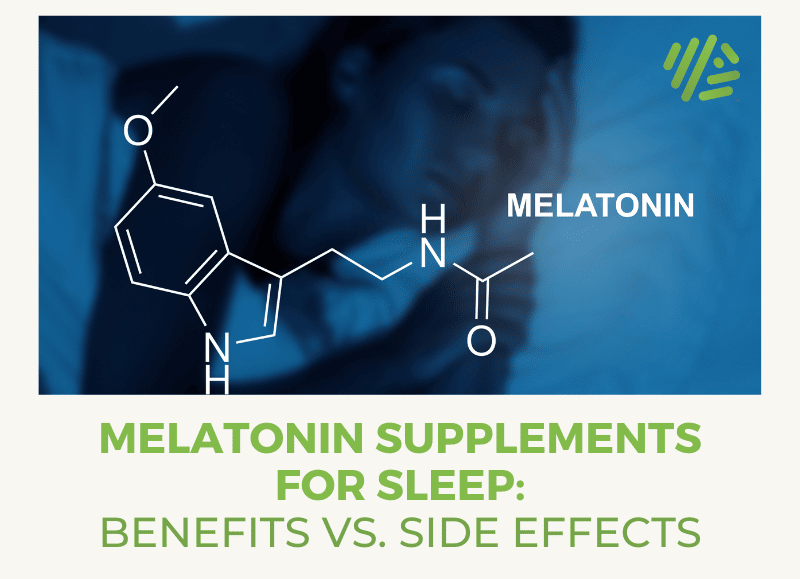Melatonin Supplements for Sleep: Benefits vs. Side Effects
Genes Mentioned

Contents
What role does melatonin play in sleep?
The brain’s pineal gland makes the hormone melatonin when darkness sets in. 1 In a healthy circadian rhythm, levels of the stress hormone cortisol peak in the morning and wane at night as melatonin, the sleep promoting hormone does its thing. Cortisol gets a bad rap, but it gets us up and going in the mornings. The trouble begins when those levels don’t naturally come down at night. Melatonin is the hormone our bodies release to signal it is time to hop in bed and get a good night’s sleep. As the day progresses and the sun sets, melatonin should naturally take the wheel. However, notice I mention melatonin’s role putting us to sleep in the context of the circadian rhythm, which is our natural clock regulated by light and and dark. Darkness brings on melatonin production, but we live in a chronically illuminated world. The blue light emitted from our phones, televisions, and LED lamps sends a signal that it’s always daytime. When nighttime does settle in, it’s polluted by technology. The results? Our bodies struggle to get the melatonin we need to sleep well. This is why many of us turn to melatonin supplements, but do they work, and if so, at what cost?Do melatonin supplements improve sleep?
The best evidence seems to indicate that melatonin can indeed help with sleep onset, meaning taking a melatonin supplement can give you the warm, fuzzy, sleepy feeling you’re looking for come bedtime. Whether you stay asleep is another story. Let’s look at the evidence for the three core areas of research on melatonin supplements and sleep: sleep onset, sleep quality, and total sleep time. A meta-analysis of 19 studies found that melatonin (usually in relatively large doses of between 2-5 mg) helped improve all three categories, but by how much?Sleep onset latency (how fast you fall asleep)
Studies demonstrate a clear benefit from taking melatonin supplements on how fast you fall asleep. Those taking melatonin fell asleep on average 7-10 minutes faster than placebo, with the benefits increasing from larger doses. 2Total sleep time
In the meta-analysis of 19 melatonin studies, total sleep time was increased by an average of 8 minutes in the supplement group vs. the placebo group. 2 The studies did show a clear benefit for taking melatonin, but let’s be real, 8 minutes of extra sleep does not add all that much to the “bright eyed and bushy tailed” factor for most of us. Frankly, a review of the research led me to believe that supplemental melatonin is vastly overrated as a sleep supplement.Sleep quality
Many of the studies in the meta-analysis showed some benefit for sleep quality as well. This is the most malleable of the metrics studied because sleep quality is the subjective assessment of each individual after they wake up. In essence, it’s the scientific equivalent of the age old question “good morning, how did you sleep last night?” 3Melatonin vs. popular sleep medications
Melatonin doesn’t outperform popular prescription sleep medications, like Ambien, when measuring sleep onset, quality, and time. The prescription medications are more effective, however, melatonin isn’t thought to be habit forming, which is a major problem with sleep drugs. 2Melatonin side effects
According to Penn Medicine, melatonin supplements can cause side effects such as:- headaches,
- dizziness,
- nausea,
- irritability,
- or daytime drowsiness
- disrupted sleep patterns



